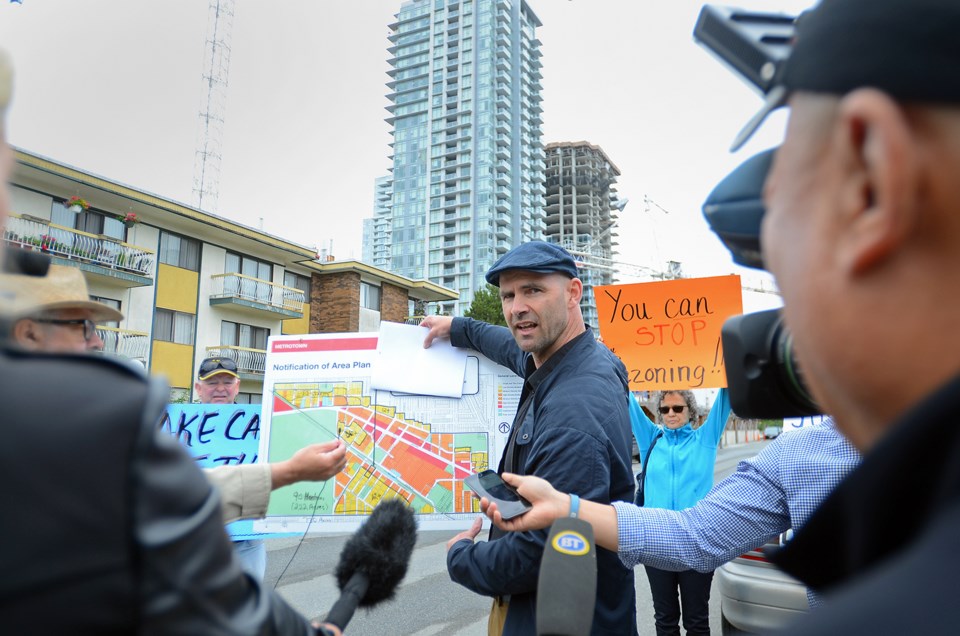Every big city has one, a downtown.
In Vancouver, the downtown is a financial and entertainment hub mixed with a diverse range of residents.
The City of Burnaby is hoping to join the ranks of the big players, and is considering creating a downtown of its own in Metrotown.
The Metrotown Development Plan update is a document that lays out a vision for the area for the next few decades, including a focus on Metrotown becoming the city’s downtown.
According to a staff report, the vision for Metrotown is “to establish an exciting, inclusive and sustainable downtown for Burnaby; one comprised of well-connected neighbourhoods that provide a sense of place and community identity; provide major office, business, tourism and employment opportunities; provide a variety of housing choices; provide civic, recreational and cultural amenities and facilities that serve the needs of the Metrotown community and Burnaby as a whole.”
The idea is part of an overall update to the city’s Metrotown Development Plan.
Coun. Sav Dhaliwal said the city knows the area will be a mix of residential, retail and commercial space, but now officials want to know what people think of Metrotown as a downtown.
He sees Metrotown becoming the city’s financial centre, with shopping, hotels and entertainment facilities, including amenities like a convention and performance centre. Dhaliwal said a downtown is a natural progression for a city the size of Burnaby.
“I think we want to start getting people to think ‘what would you like if this was to be known as the downtown of Burnaby,’” he said, noting the plan is still in the early stages.
Dhaliwal said the plan still needs more details, like where the boundaries will be and the different densities for development.
“There seems to be a fair amount of demand now from our development community to see what’s going to be the future,” he said.
The report noted some of the land use changes include concentrating the highest densities and greatest mix of uses in the downtown core and along the Kingsway corridor.
Other areas that are proposed to be re-designated from single-use to mixed-use include: Royal Oak Avenue, south of Kingsway; Beresford Street, east of Telford Avenue; and Imperial Street, between Nelson and Dunblane avenues.
Metrotown is one of four “quadrants” or town centres the city is focusing on for a majority of the new development in Burnaby to meet the regional growth strategy.
The city is now working on the public consultation part of the plan after city council recently got a chance to view it.
But the plan has also become ground zero in the battle over development and the “renoviction” issue in Burnaby.
A group of housing activists have started Stop Demovictions Burnaby, which is trying to halt development of older low-income units in the Metrotown area.
One of the group’s recommendations calls on the city to scrap the Metrotown plan and create a new community plan that focuses on current residents most vulnerable to displacement and dedicate city-owned land to social housing.
Rick McGowan, of the Metrotown Residents’ Association, said he was disappointed to see the plan come out without any consultation with residents or the public.
He said residents in Metrotown have been asking for an updated plan since 2010, without hearing from the city.
“I’m disappointed in the process,” he said, adding that to him it feels like the city is trying to rush the plan.
The city wants the plan adopted by the end of 2016.
McGowan suggested there are 680 units either threatened or already demolished in the neighbourhood, and he suspects the number will increase under the plan.
“Our biggest concern is that it’s going to speed up the displacement of low income renters in the Maywood area,” he told the NOW, noting the plan is calling for more highrises in the area.
He also questioned whether Metrotown was even a good fit for downtown, arguing downtowns like Vancouver happen organically and are made up of all people from all walks of life.
“If it’s a downtown at the expense of low income renters, then I’m not really interested in it happening here,” McGowan said.
But the downtown idea is getting an early warm response from the business community.
Burnaby Board of Trade president and CEO Paul Holden suggested amenities like a convention or performance centre could have a positive impact on business in the area.
Whether focusing on one area as a downtown could take away from the other areas like Brentwood or Lougheed, Holden said he would understand the worry but added the city is usually good at considering the business community’s concerns.
“The goal is to make sure that areas such as the Heights and others can continue to thrive and, in fact, improve,” he said.
Holden hopes the business community will be part of any consultation as the plan moves forward.



